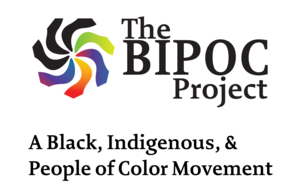… to alleviate the burden off of BIPOC to have these necessary conversations.
This was the first time the acronym BIPOC was mentioned in the forum (according to search results). It was now to me, and I had to google it to learn more. The term is not (yet) in Wikipedia nor in most of the large online dictionaries, but I found almost identical definitions here:
https://en.wiktionary.org/wiki/BIPOChttps://www.allacronyms.com/BIPOChttps://www.urbandictionary.com/define.php?term=BIPOCVarious aspects of the term are discussed here:
https://www.reddit.com/r/socialjustice101/comments/ctro2k/bipoc/https://everydayfeminism.com/2017/08/light-skinned-poc-spaces/Acronym: BIPOC — Definition: Black, Indigenous, and People of Color (project)
So what is the BIPOC project? I found two sites explaining that:
The BIPOC Project aims to build authentic and lasting solidarity among Black, Indigenous and People of Color (BIPOC), in order to undo Native invisibility, anti-Blackness, dismantle white supremacy and advance racial justice. Our project centers Indigenous, Black and communities of color.

Our Mission
The BIPOC Project aims to build authentic and lasting solidarity among Black, Indigenous and People of Color (BIPOC), in order to undo Native invisibility, anti-Blackness, dismantle white supremacy and advance racial justice.
We use the term BIPOC to highlight the unique relationship to whiteness that Indigenous and Black (African Americans) people have, which shapes the experiences of and relationship to white supremacy for all people of color within a U.S. context. We unapologetically focus on and center relationships among BIPOC folks.
Our Thinking
This nation is firmly entrenched in maintaining white supremacy, patriarchy and capitalism. This reality has been resisted in multiple ways, including organizing led by and among various communities of color for survival. However, many efforts still focus only on combating white supremacy, with limited attention to the way communities of color adopt and reinforce these harms amongst ourselves and against other marginalized groups in a “race towards the bottom” for naming our pain. As a result, many multiracial BIPOC communities continue to be challenged to develop authentic and accountable inter-group relationships despite a shared struggle under white supremacy. These challenges often undermine anti-racist organizing among people of color because each community is differently shaped and situated depending on intersectional issues and identities.
BIPOC Project Solidarity Principles
1. Decolonize Stories - Seek, learn, share and affirm the distinct histories of BIPOC communities; and unlearn dominant narratives
2. Develop a Power Analysis - Consider how each BIPOC community is differently situated in the racial hierarchy and differently affected by issues
3. Uplift Native and Black Humanity - Honor the legacies of Native and Black resistance to colonization and white supremacy; and actively examine how disparities and injustices uniquely affect Native and Black communities
4. Organize Your People – ‘Call in’ your communities to deeper understanding and empathy for all BIPOC communities with love and compassion
5. Build Intergroup Connections and Relationships – Build just relationships; and invest in one another’s liberation
6. Commit to Personal and Collective Healing – Practice both individual and community care; acknowledge ruptures and invite connection; and center healing and transformative justice
Our Theory of Change
People of color have always understood the need for our own spaces without white people present, for our own safety and healing. The BIPOC Project expands on this fundamental understanding and seeks to directly address the gaps in building authentic and sustainable solidarity:
• We address how three pillars of racism – Native invisibility, anti-Blackness and white supremacy - are internalized and show up in mutually reinforcing, distinct, and specific ways within BIPOC spaces and impede our efforts to collaborate across difference;
• We disrupt calls for “unity” by making explicit dynamics of power across intersectional identities within a racial hierarchy underpinned by Native invisibility, anti-Blackness and white supremacy, and center BIPOC most at the margins;
• We seek to intentionally reframe the Black/white binary to cultivate anti-racist analysis, knowledge and practice among a wider group of BIPOC, to call us all into racial justice work; and
• We offer a vision of solidarity rooted in reimagined relationships between BIPOC in an anti-Black, white supremacist society.
There is a corresponding Facebook page:
The BIPoC project aims to build solidarity among Black, Indigenous and People of Color (BIPoC) to advance racial justice outside the 'white gaze.
— 709 people like this — 780 people follow this
http://TheBIPOCPROJECT.org/
I found an example of BIPOC activism:
Soul Fire Farm is a BIPOC*-centered community farm committed to ending racism and injustice in the food system. We raise and distribute life-giving food as a means to end food apartheid. With deep reverence for the land and wisdom of our ancestors, we work to reclaim our collective right to belong to the earth and to have agency in the food system. We bring diverse communities together on this healing land to share skills on sustainable agriculture, natural building, spiritual activism, health, and environmental justice. We are training the next generation of activist-farmers and strengthening the movements for food sovereignty and community self-determination.
Another example of activism, a Facebook group:
Queering Herbalism- Black Indigenous People of Color (BIPOC) (Private group · 830 members)
About this group
This group is for folks who identify as Black, Indigenous, and/or People of Color (BIPOC) only. This includes ALL folks of color. It has become increasingly important in today's political climate to have spaces of love, healing and resistance where we can talk freedom, liberation and liberatory medicine and decolonial health and healing and co-creation of community among ourselves.
I wonder what members of the NAFPS forum think about this term and the associated movement(s) and activities?